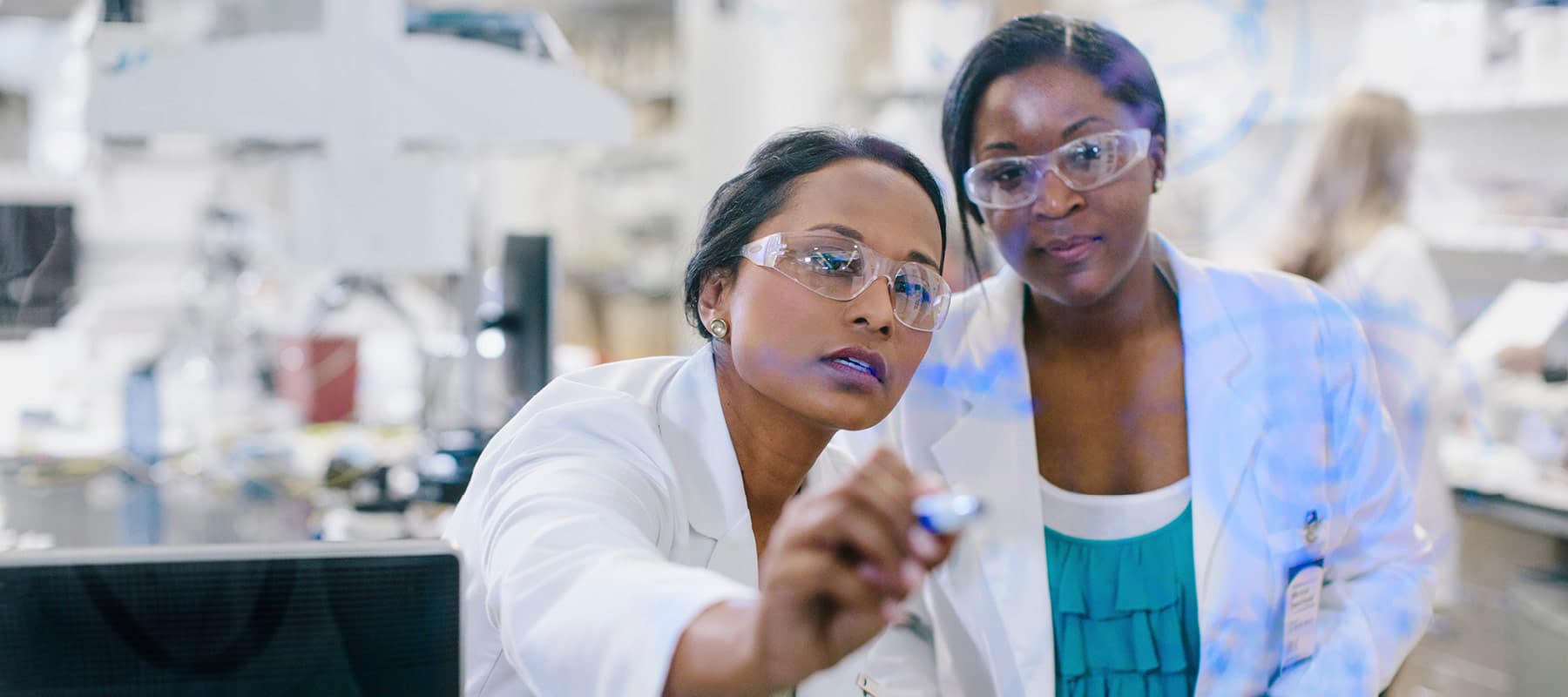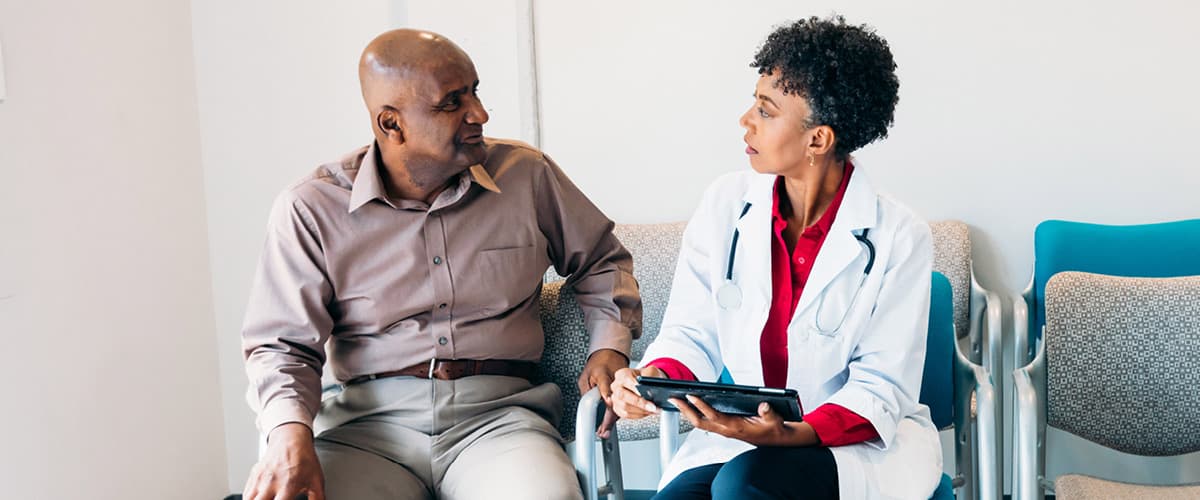
Health equity innovation must go beyond the science
Just as scientific innovation is essential to advancing health, systemic healthcare innovation is required to tackle health disparities. Factors outside of science – such as racism, discrimination, and lack of access to quality health care – create barriers that prevent some people from benefiting from hard-won scientific advancements. Innovation must go beyond science to address disparities in cancer care.
“We need transformational medicines to close the health equity gap, but we can’t stop there,” says Michael Petroutsas, SVP, Head of the US Oncology Business Unit, GSK. “Reducing inequities will take collaboration throughout our industry and engagement with providers and patients.”
Disparities are dire throughout oncology, including in ovarian cancer and multiple myeloma. More than 20,000 individuals will be diagnosed with ovarian cancer in the U.S. this year, joining the 235,000 already living with the disease.1 While ovarian cancer impacts all races and ethnicities, Black and Hispanic patients were found to have a significantly longer time to diagnosis.2 Black and Asian people are the least likely to be referred to genetic testing and counseling, although they show higher rates of HRD mutations common in ovarian cancer tumors.3
Black people also face increased risk for multiple myeloma and have higher mortality rates compared to white people, without experiencing the same survival gains over time.4 The higher death rates among Black patients with multiple myeloma are likely due to lower treatment utilization and access 5 – Hispanic and Black patients are less likely to be treated with stem cell transplantation than white patients. To better understand these disparities and develop strategies to resolve them, the industry must combine science and technology with community partnership and transparent conversations.
Ensuring inclusion in clinical research.
To understand how medicines will work in the populations that need them most, clinical trials must represent the demographics of the patients affected by the disease. Diversifying clinical trials requires collaboration, with companies working with peers, providers and patients to reshape how clinical trials are conducted and enrolled.

All of the news, delivered with full-text to your inbox. For professionals discovering, developing, and marketing biopharmaceutical drugs.
“The diversity in our clinical trials must mirror the patient communities the treatment hopes to serve,” says Michel Reid, Sr. Director and Head, Global Demographics and Diversity, GSK. “For 2022, we’ve committed to instituting diversity plans to enroll patients representative of the epidemiology of the disease we’re studying in at least 75% of our Phase 3 clinical trials.”
New approaches to clinical research can also support advances in health equity. Collecting real world evidence expands the understanding of health disparities in cancer and informs solutions for patients. For example, poly (ADP-ribose) polymerase (PARP) inhibitors, also referred to as maintenance therapy, can be effective in delaying ovarian cancer from returning in certain patients. However, a rigorous analysis of ovarian cancer treatment revealed a notable disparity: Black women were treated with PARP inhibitors at a substantially lower rate than white women and were underrepresented in the industry-wide trials used to validate these therapies.6,7
Another way to diversify clinical research is to conduct geospatial analysis of epidemiology across geographies to identify where needs are most prevalent, which makes it possible to engage with patients and place trials where they can do the most good.

Building connections and earning trust.
The healthcare industry must earn the trust of skeptical communities who have faced medical mistreatment. GSK funds projects to build connections and earn trust in these communities by fostering greater disease awareness and better understanding of clinical research. For example, students in one for-credit college course are trained by oncologists at GSK to conduct surveys in communities of their own similar social context about ovarian cancer awareness, and then schedule follow-up phone calls to share more information for anyone interested. They learn how to analyze their data, present it at conferences, and publish manuscripts. The students also share educational information about clinical trial participation and provide resources to the community members during their outreach.
Ambassador programs should be dedicated to forging community connections, listening, learning and creating initiatives tailor-made for the communities they serve. For example, one GSK Oncology program involves women living with advanced or recurrent ovarian cancer serving as mentors to women who are newly diagnosed with the disease, providing support and answering common questions.
Learning from conversations to help people get back to care.
Early in the COVID-19 pandemic, preventative care and cancer screenings dropped significantly, especially among underserved populations and women. That is why it is so important to understand how to support people in getting back to care. That insight takes more than data. It takes connection. Connections lead to conversations that help inform thoughtful decisions about how to get people back to care.
“Early diagnosis is the best defense against cancer,” says Petroutsas. “Delays in diagnosis for underserved communities drive inequity in overall prognosis and survival. But a one-size-fits-all approach will not get people back to care. We must see the whole person to understand how we can better support their health. It starts with listening and learning.”
Supporting broad access to care.
When people do need treatment for cancer, financial concerns should not create a barrier. Recognizing that treatment considerations and costs can add undue stress, the Together with GSK Oncology program offers patients and healthcare professionals various access and reimbursement services for the company’s products, all in one place.
Going further by learning together.
The healthcare industry’s response to COVID-19 showed what can be accomplished when its leaders align on common goals. That same unity is forming around health disparities. Companies throughout healthcare acknowledge the systemic nature of health disparities and are beginning to take a systematic approach to equity. While robust independent efforts are important, to truly transform healthcare – an industry that is strongest when it is collaborating – a collective, holistic focus on equity will ensure better health for all. Uniting science, technology and talent will make it possible to get ahead of disease together.
References:
1Cancer of the ovary – cancer stat facts. SEER. https://seer.cancer.gov/statfacts/html/ovary.html
2Huepenbecker S, et al. Presented at: SGO Annual Meeting on Women’s Cancer; March 19-25, 2021
3Lin J, et al. Presented at: SGO Annual Meeting on Women’s Cancer; March 19-25, 2021
4Myeloma – Cancer Stat Facts. SEER. https://seer.cancer.gov/statfacts/html/mulmy.html
5What are some disparities in the treatment and care of multiple myeloma patients? International Myeloma Foundation. https://www.myeloma.org/diversity/are-some-disparities-treatment-care-multiple-myeloma-patients
6Mojdehbakhsh R, et al. Presented at: SGO Annual Meeting on Women’s Cancer; March 19-25, 2021
7Dawood, et al. Presented at: ESMO 2021; Sept. 16-21, 2021